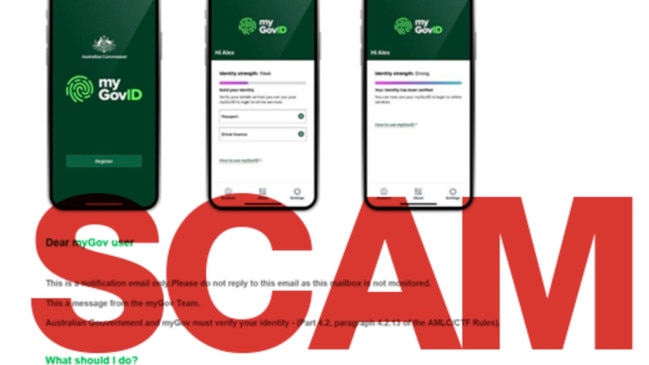Online scams run rife as tech giants prioritise their profits ahead of sound policy
Meta, the parent company of Facebook, says it’s cracking down on fake celebrity financial scams, yet the response I got when I reported several scam ads suggests otherwise.

Just as AI technology is getting more sophisticated, so are the scammers using it to defraud millions of dollars from unsuspecting Australians each year.
Of the various methods which scammers employ, online and social media scams have overtaken traditional phone and SMS as the scamming method of choice.
Known under the umbrella of celebrity scams, the use of celebrities to endorse investments has evolved over the past few years. Early versions were in the form of fake news stories which displayed images of well-known Australians along with quotes noting their personal success using investment trading websites or services.
Fortescue’s Andrew Forrest commenced legal action against Meta in 2022 for failing to stop this type of scam, which in that particular case was a cryptocurrency trading scam using his image.
More recently, scammers have used AI technology to create realistic videos of well-known Australians to promote fake investment products and services. And it has worked; losses from online and social media scams have increased 100 per cent from $40m in 2021 to $80m in 2023.
To combat this, the federal government wants to introduce a Mandatory Scams Code Framework that would impose obligations on social media companies as well as banks and telecommunications companies to proactively detect, respond and prevent these types of scams.
Given the banks are usually left to clean up the mess after a customer transfers money to a scam that likely originated from a social media platform, the banking sector has established a comprehensive set of anti-scam measures through a $100m Scam-Safe Accord ahead of the government’s planned scam framework. Australian Banking Association chief executive Anna Bligh says: “Our industry’s Scam-Safe Accord is a major step-up in protections from banks to shield consumers from scammers. It’s a set of world-leading safeguards by banks to help keep the money of Australians safe.”

Known as the “scam chain”, people generally do not lose money by simply clicking on a celebrity scam ad, they need to transfer money to the scammer which is normally done using the banking system. And this is partly why banks have been notorious for “debanking” customers who they deem to be dubiously associated with cryptocurrency and blocking cryptocurrency transactions for many more.
As crypto is the preferred payment method for scammers, once funds leave the traditional banking system to cryptocurrency it becomes almost impossible for victims to get their money back
Bligh says on this: “Better protecting Australians from scammers can only be achieved if every part of the scam chain leans in as hard as they can. Banks and the telcos have said they will back the government’s mandatory industry codes, and the social media platforms should do the same.”
But why the reluctance from social media platforms to proactively eliminate scam ads?
CHOICE senior campaigns and policy adviser Alex Soderlund says: “It’s disappointing that digital platforms are still refusing to come to the table to stop scammers exploiting their tools to steal from people … Big tech companies have a perverse incentive not to act on scams because they generate advertising revenue, so it’s clear that only strong mandatory rules to prevent scams developed and enforced by a regulator will result in any meaningful change for consumers.”
While it is unclear how much revenue social media platforms generate from fraudulent advertisements, 17,500 people reported to the government’s anti-scam centre Scamwatch that they lost money via social networks in 2023. Studies show that only 10 per cent of scam victims report their loss to government authorities, meaning the actual number of people scammed via social media last year could be closer to 175,000.
Assuming a 2 per cent success rate for social media scams, then potentially 8.75 million scam ads could have been paid for and shown across social media platforms in 2023.
Having researched investments scams for the past few days, the social media algorithm picked up my own sudden interest in exotic investments and started feeding me celebrity scam ads, flooding my social media feeds with a constant stream of apparently life-changing investment offers.
The first was an AI-generated video of former ASX chief Dominic Stevens claiming how he wanted to keep busy after leaving the ASX and so he set up a chat group to share five stock ideas a week, promising returns of more than 60 per cent per year and being personally responsible for any loss.
Shortly after, another ad appeared – this time from “Karl Stefanovic” interviewing a political reporter on an investment trading academy that has supposedly been endorsed by the federal Treasury Department.
And more kept coming, one after another. I decided to take action and see if the social media companies were in fact being unfairly treated in their portrayal as laggards to the fight against online scammers.
Meta, the parent company of Facebook, said in a February statement this year: “Meta will continue to support the industry’s and government’s efforts to disrupt and reduce scams in Australia, including through our policies and automated systems that prohibit and disrupt this type of abusive behaviour, as well as on-platform enforcement, tools and features.”
So I proceeded to report several scam ads and waited with interest to see how the social media platform would react.
Surely it would see that the ads were bogus and designed to defraud people of money and take action to remove them. But to my surprise, I received support messages one by one in response to each individual complaint saying exactly the same thing: “We didn’t remove the ad. We’ve taken a look and found that this ad doesn’t go against our advertising standards.”
Unfortunately where there is a choice between what is doing right and doing what makes the most profit, big business has historically opted for the latter. As such, the federal government’s Mandatory Scams Code Framework cannot come soon enough to reduce the losses from online investment scams.
James Gerrard is principal and director of Sydney financial planning firm www.financialadvisor.com.au







To join the conversation, please log in. Don't have an account? Register
Join the conversation, you are commenting as Logout